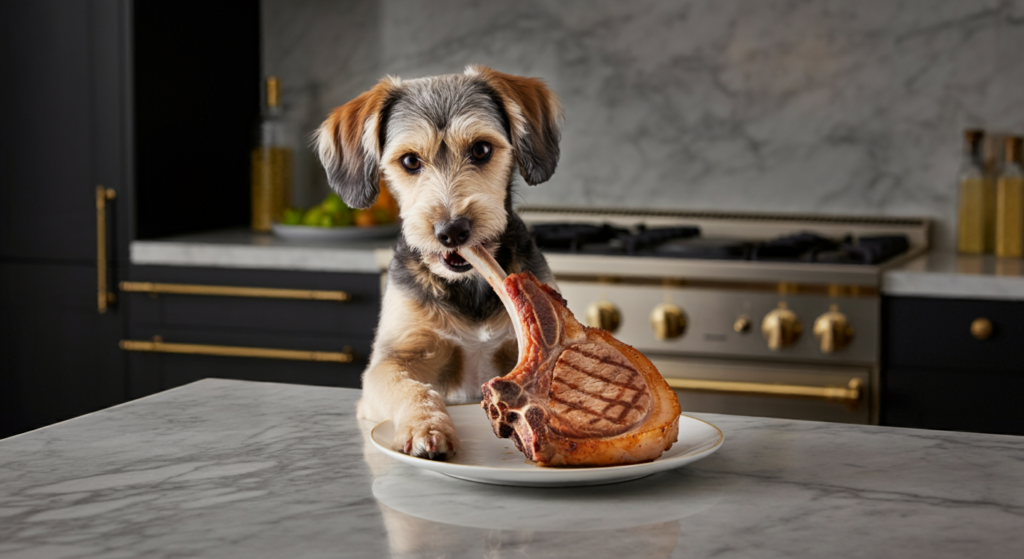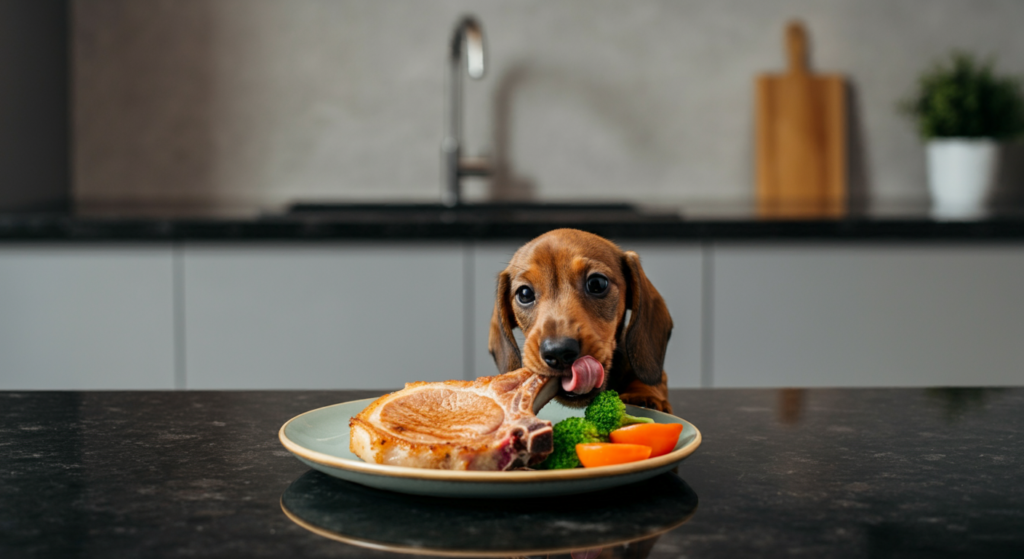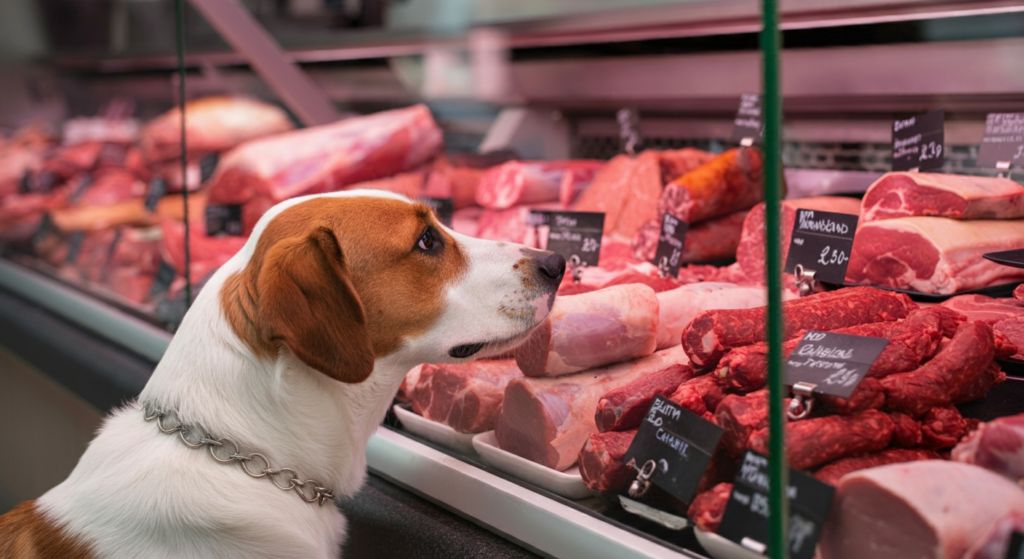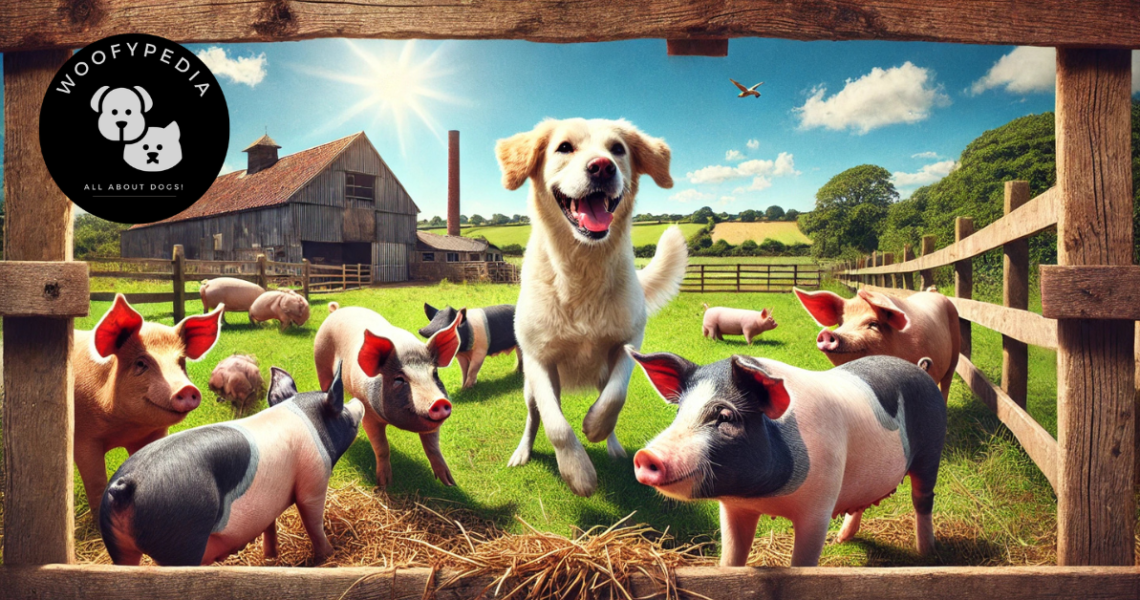Can dogs eat Pork?
Can Dogs Eat Pork? Owner’s Guide to This Tasty Treat!
As dog owners, we’re constantly vigilant about what’s safe for our furry friends to eat. With so many human foods being potentially harmful to dogs, it’s natural to question everyday items in our diet.
Yes, dogs can eat pork, but only under specific conditions. Plain, thoroughly cooked pork without seasonings is safe for dogs and can even provide some nutritional benefits. However, certain forms of pork, like processed meats or dishes with added spices, are unsuitable for your pet. Let’s explore how to safely offer pork to your dog and avoid potential risks.
Table of Contents

What Is Pork?
Pork is the meat of pigs and is a globally popular protein. It is rich in nutrients such as protein, B vitamins, and minerals like zinc and iron. In human cuisine, pork is often seasoned, smoked, or cured into products like bacon, ham, and sausages. However, these preparations can include ingredients harmful to dogs, such as excessive salt, fat, and seasonings.
Nutritional Overview
Pork is a rich source of:
- Protein: Essential for muscle development and energy.
- Vitamin B12: Aids in red blood cell formation and supports the nervous system.
- Zinc: Promotes immune function and healthy skin.
- Iron: Supports oxygen transport in the bloodstream.
Benefits of Pork for Dogs
1. High-Quality Protein
Pork is a complete protein source, supporting muscle maintenance, repair, and overall vitality.
2. Essential Vitamins and Minerals
- Vitamin B12: Supports neurological health and red blood cell production.
- Zinc: Essential for a robust immune system.
- Iron: Boosts energy by improving oxygen circulation.
3. Palatability
Dogs often find pork delicious, making it an excellent choice for picky eaters.
4. Digestibility
When properly cooked, pork is easy to digest and may suit dogs with sensitivities to other proteins.
Risks of Feeding Pork to Dogs
1. Trichinosis
Raw or undercooked pork can contain the parasite Trichinella spiralis, which may cause trichinosis. Always cook pork to an internal temperature of at least 145°F (63°C).
2. High Fat Content
Excess fat can lead to:
- Pancreatitis: A serious and painful condition.
- Obesity: Unhealthy weight gain.
3. Seasonings and Additives
Avoid pork cooked with toxic ingredients like garlic, onion, or excessive salt.
4. Bones
Cooked pork bones can splinter, causing:
- Choking hazards.
- Intestinal injuries.
5. Processed Pork Products
Bacon, ham, and sausages are high in salt and unhealthy fats, increasing risks of:
- Salt poisoning.
- Long-term health issues like heart or kidney disease.
6. Allergic Reactions
Some dogs may be allergic to pork, showing symptoms like itching, digestive upset, or swelling.

Can Puppies Eat Pork?
Key Considerations for Puppies
- Cooking and Preparation
- Ensure the pork is fully cooked to an internal temperature of at least 145°F (63°C) to eliminate harmful parasites like Trichinella spiralis.
- Serve it plain—avoid seasonings, salt, and sauces that could upset your puppy’s stomach.
- Portion Size
- Puppies have small stomachs, so offer only a tiny portion of pork as an occasional treat, not a main meal.
- Trim the Fat
- High-fat foods can strain a puppy’s immature digestive system and may lead to pancreatitis or obesity. Trim any visible fat before cooking.
- No Bones
- Never give cooked pork bones to puppies as they can splinter, causing choking or internal injuries. Even raw bones should be avoided for puppies due to their less robust digestive systems.
- Allergy Monitoring
- Introduce pork slowly to watch for potential allergies or intolerances. Symptoms may include itching, swelling, vomiting, or diarrhoea.
Benefits of Pork for Puppies
When prepared correctly, pork can provide some nutritional benefits for growing puppies, such as:
- Protein: Essential for muscle development and growth.
- Vitamin B12: Supports the nervous system and red blood cell production.
- Iron: Helps transport oxygen in the blood, boosting energy levels.
When to Avoid Pork for Puppies
Can Puppies Eat Pork?
Yes, puppies can eat pork, but extra caution is required due to their smaller size, developing digestive systems, and nutritional needs. When offering pork to a puppy, it must be plain, cooked thoroughly, and served in very small, manageable portions. Here’s what you need to know:
Benefits of Pork for Puppies
When prepared correctly, pork can provide some nutritional benefits for growing puppies, such as:
- Protein: Essential for muscle development and growth.
- Vitamin B12: Supports the nervous system and red blood cell production.
- Iron: Helps transport oxygen in the blood, boosting energy levels.
When to Avoid Pork for Puppies
Avoid feeding pork to your puppy if:
- The pork is seasoned, cured, or processed (e.g., bacon or sausages).
- Your puppy has shown signs of food allergies or digestive sensitivity.
- The portion is too large, as overfeeding may cause stomach upset.
How to Safely Offer Pork to Dogs
If you’d like to include pork in your dog’s diet, it’s essential to prepare it properly to avoid any health risks. Follow these steps to ensure pork is a safe and enjoyable treat for your dog:
1. Choose the Right Cut
Opt for lean cuts of pork, such as pork loin or tenderloin. These are lower in fat compared to cuts like pork belly or shoulder, reducing the risk of pancreatitis and obesity in dogs.
2. Trim Excess Fat
Before cooking, remove any visible fat from the meat. Pork’s natural fat content can be hard for dogs to digest and may lead to gastrointestinal issues or more severe conditions like pancreatitis.
3. Avoid Bones
- Cooked Bones: Never feed cooked pork bones to your dog, as they can splinter and cause choking, blockages, or internal injuries.
- Raw Bones: Even raw pork bones, though softer, should only be given under strict supervision and with guidance from your vet to avoid dental fractures or digestive complications.
4. Cook Thoroughly
Always cook pork to an internal temperature of at least 145°F (63°C) to kill harmful parasites like Trichinella spiralis, which can cause trichinosis. Avoid serving raw or undercooked pork to dogs.
5. Serve Plain
Seasonings, sauces, and marinades used in human recipes often contain harmful ingredients for dogs, such as garlic, onion, or excessive salt. Always serve plain, unseasoned pork to your dog.
6. Introduce Gradually
Start with a small portion and monitor your dog for any adverse reactions, such as digestive upset or allergic symptoms (itching, swelling, or diarrhoea).
7. Portion Control
Moderation is key when feeding pork to dogs:
- For small breeds, a few bites are sufficient.
- For large breeds, offer a slightly larger portion but avoid overfeeding.
Pork should be an occasional treat, not a staple in your dog’s diet.
8. Avoid Processed Pork Products
Skip giving your dog items like bacon, ham, sausages, or pork rinds. These are high in salt, preservatives, and unhealthy fats that can harm your dog’s health.
9. Store Leftovers Safely
If you have leftover cooked pork, refrigerate it promptly and use it within a few days. Never serve spoiled or old pork to your dog.
Alternatives to Pork
If pork isn’t suitable for your dog, consider these alternatives:
- Chicken: A lean, digestible protein.
- Turkey: Another low-fat option rich in nutrients.
- Fish: High in omega-3 fatty acids, great for skin and coat health.

Fun Facts About Dogs and Pork
- Wild boars, a type of pig, were part of the diet of dogs’ ancestors.
- Many commercial dog foods feature pork as a primary protein.
- Pork-flavoured treats are popular among dogs, but ensure they are free from harmful additives.
Conclusion
Can dogs eat pork? Yes, when served plain, cooked, and in moderation. Always avoid processed, seasoned, or fatty pork, and consult your vet if introducing pork for the first time. Your dog’s health and safety should always come first!
Have you tried giving your dog pork? Share your experience in the comments below!
FAQ: Can Dogs Eat Pork?
1. Can dogs eat cooked pork?
Yes, dogs can eat cooked pork, but it must be plain, thoroughly cooked, and free from seasonings, sauces, and harmful additives like garlic or onion. Always remove excess fat and bones before serving.
2. Can dogs eat pork chops?
Yes, dogs can eat pork chops if they are boneless, cooked thoroughly, and unseasoned. Avoid giving cooked bones, as they can splinter and cause injuries.
3. Can dogs eat pork tenderloin?
Yes, pork tenderloin is a lean cut of meat and can be a healthy option for dogs when cooked thoroughly and served plain. Trim off any visible fat before cooking.
4. Can dogs eat pork bones?
No, cooked pork bones should never be given to dogs as they can splinter and pose choking hazards or cause internal injuries. Raw pork bones can sometimes be safe but should only be given under veterinary guidance and close supervision.
5. Can dogs eat pork fat?
No, pork fat is not safe for dogs as it can cause digestive upset or lead to pancreatitis, a painful and potentially life-threatening condition.
6. Can dogs eat raw pork?
Raw pork is not recommended for dogs as it may contain parasites like Trichinella spiralis, which can cause trichinosis. Always cook pork to an internal temperature of at least 145°F (63°C).
7. Why is there no pork in most dog food?
Pork is less commonly used in dog food because it is higher in fat than other proteins like chicken or fish, making it less desirable for regular feeding. Additionally, cultural and supply factors may limit its inclusion in commercial diets.
8. What meat should dogs not eat?
Dogs should avoid meats that are:
- Seasoned with harmful ingredients like garlic or onion.
- Processed meats like bacon, sausages, and ham, which are high in salt and fat.
- Spoiled or raw meats that may carry bacteria or parasites.
9. What should I do if my dog ate pork?
If your dog accidentally ate pork:
- Cooked, plain pork: Monitor for any signs of digestive upset.
- Seasoned or fatty pork: Watch for symptoms like vomiting, diarrhoea, or lethargy, and consult your vet if necessary.
- Cooked bones: Contact your vet immediately if your dog shows signs of choking, discomfort, or digestive blockage.
10. What are the benefits of pork for dogs?
Pork, when prepared safely, can provide:
- High-quality protein for muscle maintenance and growth.
- Essential nutrients like vitamin B12, zinc, and iron.
- A palatable option for picky eaters.
